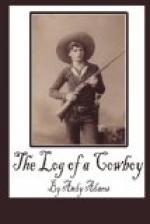We halted at our night camp to change horses and to unearth our cached tomatoes, and again set out. By then it was so late in the day that the sun had lost its force, and on this last leg in overtaking the herd we increased our gait steadily until the sun was scarcely an hour high, and yet we never sighted a dust-cloud in our front. About sundown we called a few minutes’ halt, and after eating our tomatoes and drinking the last of our water, again pushed on. Twilight had faded into dusk before we reached a divide which we had had in sight for several hours, and which we had hoped to gain in time to sight the timber on Powder River before dark. But as we put mile after mile behind us, that divide seemed to move away like a mirage, and the evening star had been shining for an hour before we finally reached it, and sighted, instead of Powder’s timber, the campfire of our outfit about five miles ahead. We fired several shots on seeing the light, in the hope that they might hear us in camp and wait; otherwise we knew they would start the herd with the rising of the moon.
When we finally reached camp, about nine o’clock at night, everything was in readiness to start, the moon having risen sufficiently. Our shooting, however, had been heard, and horses for a change were tied to the wagon wheels, while the remainder of the remuda was under herd in charge of Rod Wheat. The runaways were thrown into the horse herd while we bolted our suppers. Meantime McCann informed us that Flood had ridden that afternoon to the Powder River, in order to get the lay of the land. He had found it to be ten or twelve miles distant from the present camp, and the water in the river barely knee deep to a saddle horse. Beyond it was a fine valley. Before we started, Flood rode in from the herd, and said to Honeyman, “I’m going to send the horses and wagon ahead to-night, and you and McCann want to camp on this side of the river, under the hill and just a few hundred yards below the ford. Throw your saddle horses across the river, and build a fire before you go to sleep, so we will have a beacon light to pilot us in, in case the cattle break into a run on scenting the water. The herd will get in a little after midnight, and after crossing, we’ll turn her loose just for luck.”
It did me good to hear the foreman say the herd was to be turned loose, for I had been in the saddle since three that morning, had ridden over eighty miles, and had now ten more in sight, while Honeyman would complete the day with over a hundred to his credit. We let the remuda take the lead in pulling out, so that the wagon mules could be spurred to their utmost in keeping up with the loose horses. Once they were clear of the herd, we let the cattle into the trail. They had refused to bed down, for they were uneasy with thirst, but the cool weather had saved them any serious suffering. We all felt gala as the herd strung out on the trail. Before we halted again there would be water for our dumb




